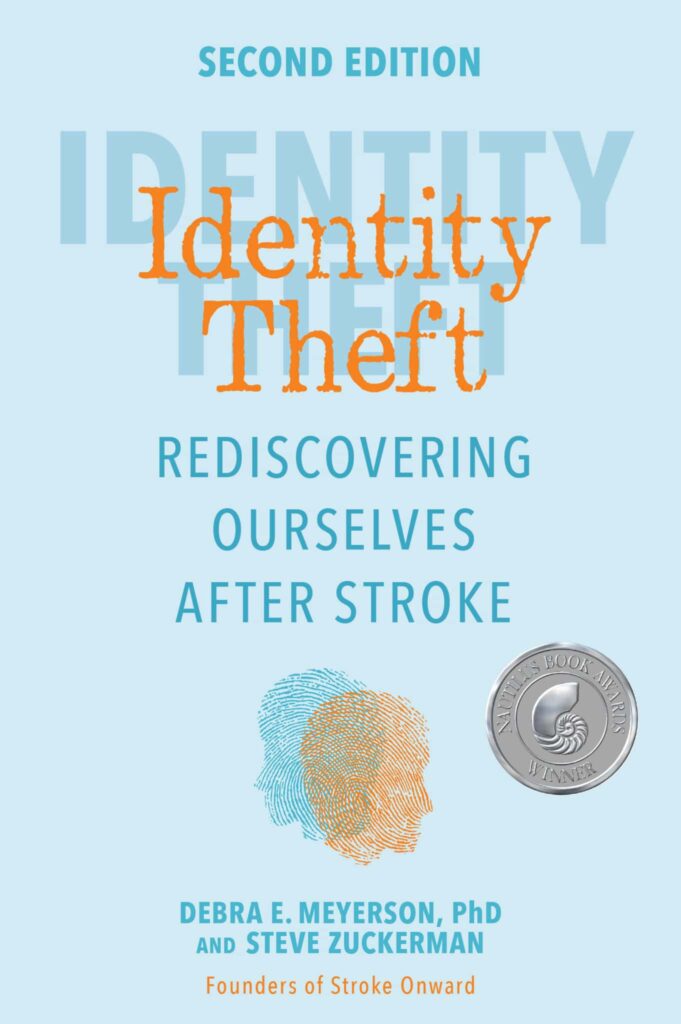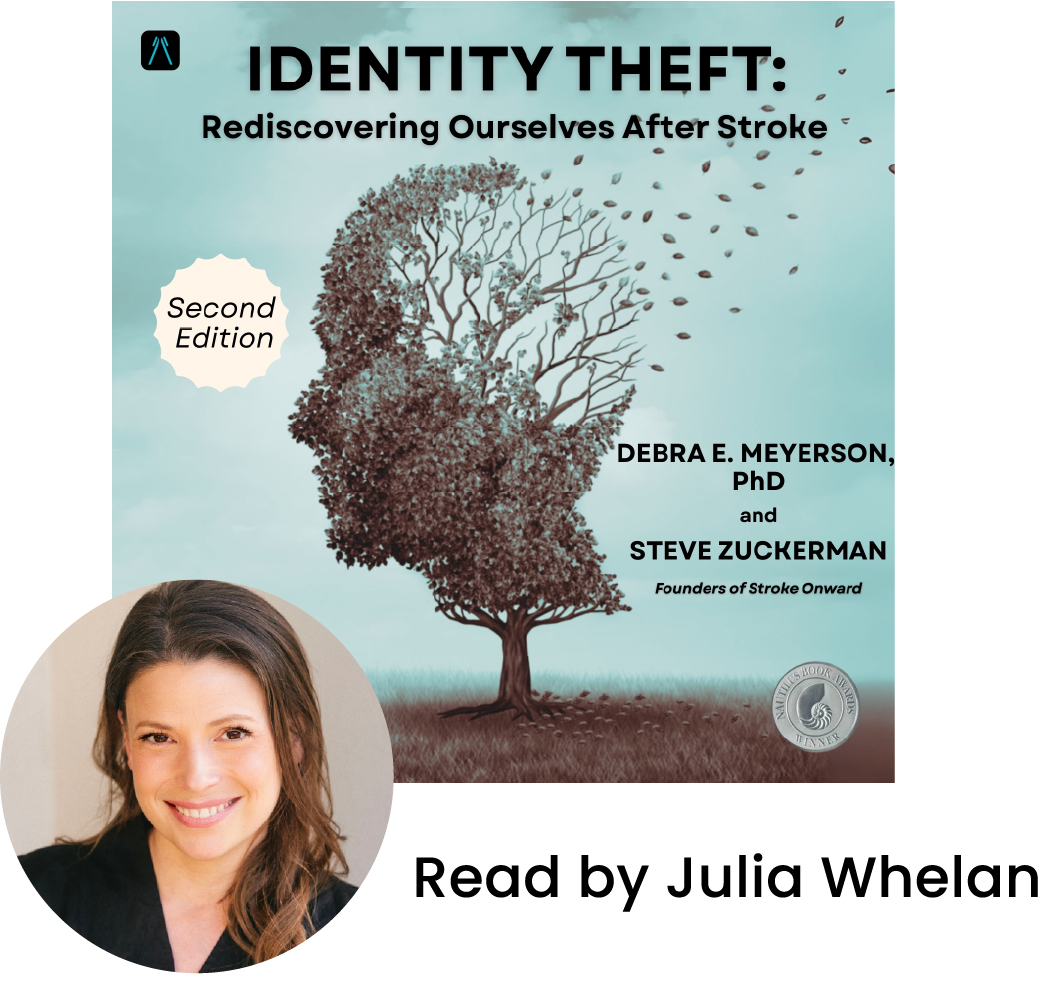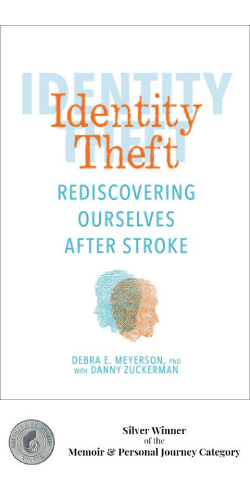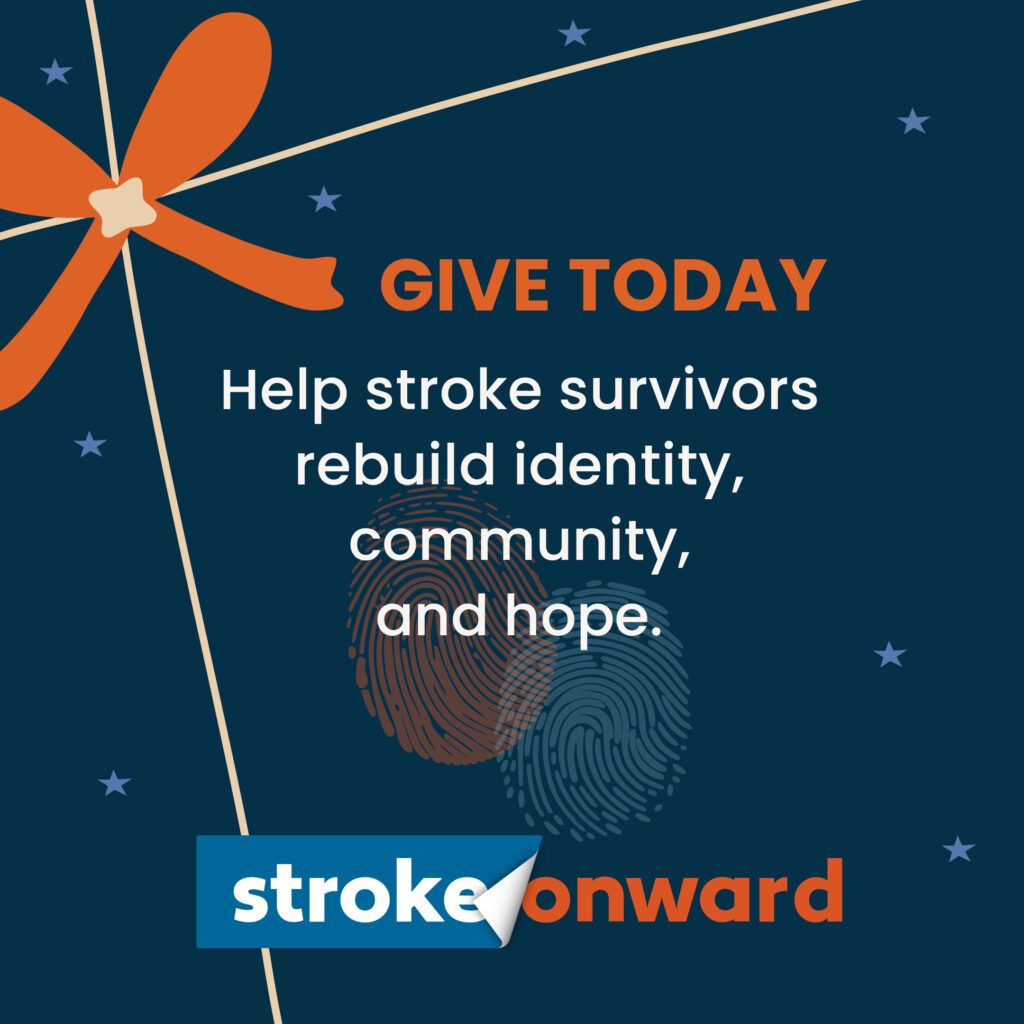Identity Theft
 Identity Theft: Second Edition, is an update to the award-winning book that follows Stanford professor Debra Meyerson’s journey to recover from a severe stroke that initially left her physically incapacitated and unable to speak. In addition to providing realistic expectations for the hard work needed to regain everyday capabilities, the book highlights the less frequently documented – but equally critical – emotional journey as Deb and her family rebuild identity in recovery. The second edition adds perspective from an additional five years of continued recovery and rebuilding their lives, including insights from the work of the nonprofit they co-founded – Stroke Onward.
Identity Theft: Second Edition, is an update to the award-winning book that follows Stanford professor Debra Meyerson’s journey to recover from a severe stroke that initially left her physically incapacitated and unable to speak. In addition to providing realistic expectations for the hard work needed to regain everyday capabilities, the book highlights the less frequently documented – but equally critical – emotional journey as Deb and her family rebuild identity in recovery. The second edition adds perspective from an additional five years of continued recovery and rebuilding their lives, including insights from the work of the nonprofit they co-founded – Stroke Onward.
Virtually every stroke survivor is haunted by questions like “Who am I now?” and “How do I rebuild a meaningful and rewarding life?” after losing so much of what they had before—capabilities, careers and jobs, relationships, and more. Identity Theft, Second Edition is a book full of hope for survivors—from stroke or other life-changing injuries or illnesses—as well as actionable advice for their care partners, families, and communities.
Identity Theft centers on Debra’s experience: her stroke in 2010, her extraordinary efforts to recover, and the journey to redefine herself. But the book also draws on her skills as a social scientist, sharing stories from several dozen fellow survivors, family members, friends, colleagues, therapists, and doctors she met and interviewed. By sharing this diversity of experiences, the authors highlight how every stroke is different and every recovery is different. They provide a valuable look at the broad possibilities for successfully navigating the challenging physical recovery, and the equally difficult and frequently unspoken emotional journey toward rebuilding one’s identity and a rewarding life after a trauma like a stroke.
Debra and her husband, Steve Zuckerman co-founded the nonprofit Stroke Onward to build on the impact of the book’s first edition—an organization working to catalyze change in the healthcare system to better integrate the emotional journey of rebuilding identity into a lifelong recovery process. This second edition draws on five more years of experience as a post-stroke couple and what Debra and Steve have learned from thousands more survivors, family members, and healthcare professionals. They’ve added new insights about the long-term recovery process and how we can change the stroke system of care to better support all survivors and their families.
All author proceeds from Identity Theft support Stroke Onward’s continued mission and future initiatives.
Additional details about Identity Theft and its authors can be found here.
Order Identity Theft: Second Edition now at these retailers
(click the logo to purchase from that vendor)
Audiobook Edition of Identity Theft
Narrated by acclaimed voice artist Julia Whelan, the audiobook of Identity Theft: Rediscovering Ourselves After Stroke offers powerful access to Debra Meyerson’s story of recovery, identity, and hope. Audiobooks are a lifeline for many stroke survivors, and we’re thrilled to bring this edition to you.
The audiobook is available with exclusive features on Audiobrary — a platform founded by narrator Julia Whelan — as well as through most major retailers linked above.

Media & Conversations Featuring Deb & Steve
Featured Media
Katie Couric Media
A stroke survivor shares the raw reality of recovery.
🔗 Article
KTVU FOX 2
Bay Area spotlight on identity and life after stroke.
🔗 Watch
Free Thinking with Montel Williams
A conversation about hope, identity, and rebuilding a life after stroke.
🔗 Watch
Real Talk with Tina & Ann
Love, loss, and rediscovering identity as a couple.
🔗 Listen
More Conversations
- The Unexpected Detour (Listen)— Redefining life and independence
- Beyond Rehab (Grief, Gratitude & the Gray In Between) (Listen)— Emotional recovery beyond rehab
- Listen for Life Aphasia (Listen)— Communication, identity, aphasia
- Chatter That Matters (Listen)— Resilience and reinvention
- Women Writers, Women’s Books (Read) — Excerpt from the Second Edition
Identity Theft in Academic Works
Roos, B., Szabo, G., Brancamp, T., Hoover, E., Sandberg, C., & Sather, T.W. (2025). The effects of in-depth exposure to the lived experience of aphasia on student learning. Teaching and Learning Communication Sciences & Disorders, 9(2), Article 3
🔗 Article
Hoover, E., Bernstein-Ellis, E., & Meyerson, D. (2023).
Using bibliotherapy to rebuild identity for people with aphasia: A book club experience. Journal of Communication Disorders, 105, 106363
🔗 Article
Sandberg, C., Brancamp, T., Hoover, E., Roos, B., Sather, T., & Szabo, G. (2023).
The effect of in-depth exposure to the lives experience of aphasia on student learning [Conference poster]. Iceland Conference (June 6, 2023).
🔗 Poster
What People Are Saying
About the First Edition
 This second edition builds on the original Identity Theft — winner of the 2021 Silver Nautilus Award for Health, Healing & Wellness.
This second edition builds on the original Identity Theft — winner of the 2021 Silver Nautilus Award for Health, Healing & Wellness.
While this new edition adds updated insights from five more years of recovery and community engagement, the first edition remains a powerful and widely used resource for stroke survivors, carepartners, and professionals alike.
Looking for tools to support discussion or group learning?
Access the First Edition Discussion Guides.
What People Said About the First Edition
Resources
Thank you for reading Identity Theft and coming here to find additional information! We appreciate your support and ongoing interest.
Throughout the second edition of Identity Theft, there are several mentions of additional resources as well as Appendix III: Link to Resources, which includes a QR code to this page.
For those who may not have yet read the second edition, Appendix III explains:
Throughout this book, we have mentioned many projects, programs, materials, and organizations related to our work at Stroke Onward…[On the] Stroke Onward web site…you can easily navigate to related information, as well as a growing base of resources that the organization will be building. At our website, please consider joining our community. We hope the resources and engagement we offer can support you in whatever journey you are on. In addition, it is only through community that we can drive real change to make the system of care better for everyone. We would love to collaborate with you in that effort. Thank you.
Links to resources here are laid out in order of mention within the paperback second edition of Identity Theft. Links here include the page number and mention from the text of the paperback format of the second edition of Identity Theft. This page also includes links to resources that were not explicitly mentioned in the book but may still be of use and interest.
Found on Page 217: “In 2022, we led Stroke Across America (see Link to Resources, page 275) a 4,500-mile journey from Astoria, Oregon, to Boston, Massachusetts.”
Found on Page 217: “As we wrote in our American Stroke Association column “Adventures: A Step Beyond Engagement” (see Link to Resources, page 275), cycling represents not just a way for us to have fun, get exercise, and engage with friends in meaningful ways but also gives us the opportunity to create real adventures.”
Found on Page 221: “Following our presentation at the 2024 Spring Institute on Disability (see Link to Resources, page 275), 144 I found myself thinking, ‘I am still an academic.’”
Found on Page 224: “About a year after publishing Identity Theft, we began writing a column for the American Stroke Association and their Stroke Connection newsletter (see Link to Resources, page 275).”
Found on Page 235: “Much of Stroke Onward’s work thus far has focused on raising awareness about this problem. That includes speaking widely at conferences and other gatherings and developing material available for free on the Stroke Onward website (see Link to Resources, page 275). The organization authors a column for the American Stroke Association’s Stroke Connection e-newsletter (see Link to Resources, page 275) and has developed a short document titled ‘Emotional Journey in Stroke Recovery,’ which serves as an introduction to help inform and normalize the emotional journey in recovery.”
Found on Page 236: “Stroke Onward has collaborated actively with organizations like Aphasia Access, the National Aphasia Association, and Virtual Connections (see Link to Resources, page 275).”
Found on Page 237: “One of Stroke Onward’s first academic collaborative initiatives involved a project with Elizabeth (Liz) Hoover from Boston University and Ellen Bernstein-Ellis from California State University, East Bay. Ellen, Liz, and their students worked with us to develop and pilot an extensive set of aphasia-friendly resources to support the reading and discussion of Identity Theft in a peer group setting (see Link to Resources, page 275).”
Found on Page 251: “José and Ben rearranged their lives to accomplish two goals: live life as fully as they could while they still had time together, and make a difference by raising awareness about ALS and raising money to help find a cure. In 2014, they founded Beyond ALS (see Link to Resources, page 275) to do the latter.”
- Beyond ALS is no longer active.





